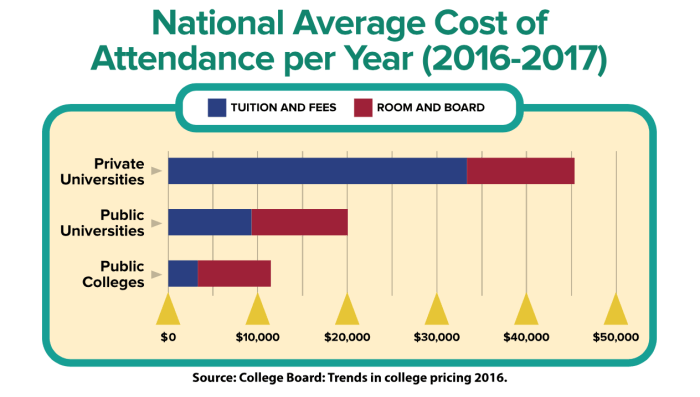
Embark on a journey into the world of college savings with a focus on Investment Horizon for College Savings. Discover how strategic planning can pave the way for a secure financial future for your child’s education.
Investment Advice

When it comes to saving for your child’s college education, seeking the right investment advice is crucial in achieving your financial goals. Proper guidance can help you make informed decisions, maximize returns, and minimize risks.
Types of Investment Advice for College Savings
- Consider long-term investment options such as 529 savings plans or Coverdell Education Savings Accounts (ESAs) to benefit from tax advantages and potential growth over time.
- Diversify your investment portfolio by investing in a mix of stocks, bonds, and mutual funds to spread out risk and increase potential returns.
- Consult with a financial advisor to develop a customized investment strategy tailored to your risk tolerance, time horizon, and savings goals.
The Importance of Seeking Professional Investment Advice
- Professional investment advisors can provide expertise and knowledge to help you navigate the complex world of investing and make sound financial decisions.
- They can offer personalized recommendations based on your financial situation and goals, ensuring that your college savings plan is aligned with your objectives.
- By working with a professional, you can stay informed about market trends, potential risks, and opportunities to optimize your investment portfolio.
Maximizing Returns and Minimizing Risks
- Investment advice can help you identify investment opportunities that align with your risk tolerance and financial objectives, maximizing the potential for growth.
- By diversifying your investments and regularly reviewing your portfolio with the help of a financial advisor, you can mitigate risks and adjust your strategy as needed.
- Regularly monitoring your investments and staying informed about market changes can help you make informed decisions to protect and grow your college savings over time.
Investment Advisor
An investment advisor plays a crucial role in providing individuals with guidance and recommendations on suitable investment options for college savings. Their expertise helps clients navigate the complex world of financial markets and make informed decisions to achieve their savings goals.
Scenarios Benefiting from Investment Advisor Advice
- When an individual is unsure about the best investment vehicles for college savings, an investment advisor can provide tailored recommendations based on the client’s risk tolerance, time horizon, and financial goals.
- In times of market volatility or economic uncertainty, seeking advice from an investment advisor can help investors stay focused on their long-term objectives and avoid making impulsive decisions that could negatively impact their college savings.
- For individuals who lack the time or expertise to actively manage their investment portfolio, an investment advisor can offer professional guidance and ongoing monitoring to ensure the portfolio remains aligned with the client’s objectives.
Qualifications and Certifications for Investment Advisor
When choosing an investment advisor for college savings, it is essential to look for certain qualifications and certifications to ensure they have the necessary expertise and knowledge:
Look for advisors who are Certified Financial Planners (CFP) or Chartered Financial Analysts (CFA), as these designations demonstrate a high level of competency and commitment to ethical standards in the financial industry.
Additionally, consider advisors who are registered with the Securities and Exchange Commission (SEC) or the Financial Industry Regulatory Authority (FINRA), as this indicates they adhere to regulatory standards and have a fiduciary duty to act in the best interests of their clients.
Investment Banking
Investment banking plays a crucial role in facilitating investment opportunities for college savings. These financial institutions help individuals access a wide range of investment products and services that can aid in growing their savings over time.
Diversifying College Savings Portfolio
Investment banking services can assist individuals in diversifying their college savings portfolio by offering access to various investment vehicles such as stocks, bonds, mutual funds, and more. By spreading investments across different asset classes, investors can reduce risk and potentially enhance returns over the long term.
Investment Banking Products and Strategies
- Initial Public Offerings (IPOs): Investment banks can provide access to IPOs, allowing investors to participate in the early stages of companies going public.
- Mergers and Acquisitions (M&A): Investment banks facilitate M&A transactions, which can provide opportunities for capital appreciation and strategic growth in a college savings portfolio.
- Debt and Equity Offerings: Investment banks help in raising capital through debt and equity offerings, enabling investors to diversify their savings across different types of securities.
- Financial Advisory Services: Investment banks offer financial advisory services to help individuals make informed investment decisions and navigate complex financial markets.
Investment Horizon

Investment horizon refers to the timeframe over which an investor plans to hold an investment before needing the funds. In the context of college savings planning, the investment horizon is crucial as it determines the appropriate investment strategy to achieve the desired financial goal.
Significance of Investment Horizon in College Savings Planning
The investment horizon in college savings planning is significant because it influences the risk tolerance and investment choices of individuals. A longer investment horizon allows for a more aggressive investment approach, while a shorter horizon may require a more conservative strategy to protect the capital.
- Short-Term Investment Horizon (0-5 years): For parents with college-bound children in the near future, a short-term investment horizon requires low-risk investment vehicles such as high-yield savings accounts or certificates of deposit (CDs) to preserve capital.
- Medium-Term Investment Horizon (5-10 years): With a medium-term horizon, parents can consider a mix of stocks, bonds, and mutual funds to potentially achieve higher returns while managing risk. Target-date funds or 529 savings plans are popular choices for this timeframe.
- Long-Term Investment Horizon (10+ years): Parents who start saving early for their child’s college education can afford to take on more risk by investing in diversified portfolios with higher exposure to equities. This long-term approach allows for more aggressive growth potential.
Investment Opportunities
When saving for college, it is crucial to explore various investment opportunities to maximize returns and reach your financial goals. Let’s discuss some options suitable for college savings.
Traditional vs. Newer Investment Options
Traditional investment opportunities like stocks and bonds have long been popular choices for college savings. However, newer options such as 529 plans or education savings accounts have gained traction in recent years. Let’s compare these options:
- Stocks and Bonds:
- Stocks: Offer high return potential but come with higher risk due to market fluctuations.
- Bonds: Provide more stability and lower risk compared to stocks, but typically offer lower returns.
- 529 Plans and Education Savings Accounts:
- 529 Plans: Specifically designed for education savings, these plans offer tax advantages and investment options tailored for college expenses.
- Education Savings Accounts: Another tax-advantaged option with more flexibility in terms of eligible expenses beyond college tuition.
Risk-Return Profile of Different Investment Opportunities
Understanding the risk-return profile of various investment opportunities is essential for making informed decisions when saving for college. Let’s delve into the risk-return profiles of different options:
| Investment Option | Risk Level | Return Potential |
|---|---|---|
| Stocks | High | High |
| Bonds | Low to Moderate | Low to Moderate |
| 529 Plans | Varies based on investment choices | Moderate to High |
| Education Savings Accounts | Low to Moderate | Moderate |
Investment Strategy
Investing in a college savings fund requires a well-thought-out investment strategy to maximize returns while managing risk effectively. It is crucial to align your investment approach with your financial goals and risk tolerance levels to ensure success in reaching your target savings amount.
Types of Investment Strategies
- Dollar-Cost Averaging: This strategy involves investing a fixed amount of money at regular intervals, regardless of market fluctuations. By consistently purchasing shares over time, you can reduce the impact of market volatility on your overall investment.
- Asset Allocation: Asset allocation involves diversifying your investment portfolio across different asset classes, such as stocks, bonds, and cash equivalents. This strategy helps spread risk and optimize returns based on your risk tolerance and time horizon.
Importance of a Well-Defined Investment Strategy
Having a clear investment strategy is essential when saving for a child’s education as it provides a roadmap for achieving your financial goals. A well-defined strategy helps you stay focused, disciplined, and proactive in managing your investments to maximize growth potential.
Tips for Aligning Investment Strategies
- Define Your Goals: Clearly Artikel your college savings goals, including the target amount and time horizon for funding your child’s education.
- Assess Risk Tolerance: Consider your risk tolerance level to determine the right mix of investments that align with your comfort level and financial objectives.
- Regularly Review and Adjust: Monitor your investments periodically to ensure they align with your goals and risk tolerance. Make adjustments as needed to stay on track towards meeting your college savings targets.
In conclusion, understanding the importance of investment horizon in college savings is key to achieving your financial goals for your child’s education. By aligning your investment strategies with the right time frame, you can secure a brighter future for your loved ones.
Question Bank
What does investment horizon mean?
Investment horizon refers to the time period over which an investor aims to achieve their financial goals, such as saving for a child’s college education.
How does investment advice play a role in college savings?
Investment advice helps in selecting suitable investment options that can maximize returns and minimize risks, ensuring a secure future for your child’s education fund.






